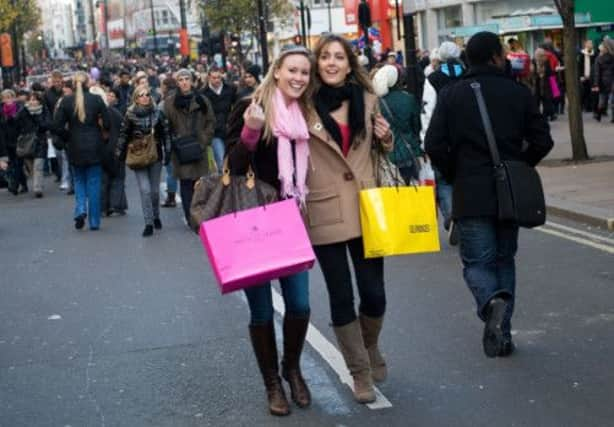Shop inflation at new low as retailers cut prices


The British Retail Consortium (BRC) warned that an early start to summer sales could pile pressure on already slim margins as figures released today show shop price inflation fell to 0.4 per cent last month, from 1.4 per cent in March.
While food inflation slowed from 3.5 to 2.9 per cent, non-food retail returned to deflationary territory with average prices falling by 1 per cent following a slim rise the month before, according to the figures compiled by the BRC and market intelligence firm Nielsen.
Advertisement
Hide AdAdvertisement
Hide AdBRC director general Helen Dickinson said: “Household finances are still under pressure but it’s clear that isn’t coming from the shops.
“In particular, price competition on non-food goods intensified in the face of average incomes rising at their slowest for more than a decade and poor demand for seasonal products.”
The unseasonably-cold weather added to the sector’s troubles as spring lines in fashion and gardening stayed on the shelves as customers waited for warmer temperatures.
But Mike Watkins, head of retailer and business insight at Nielsen, said the trend was good news for shoppers, especially as it looked set to continue.
“Retailers will be looking to keep prices competitive over the next few weeks to keep whatever momentum there is in sales growth going, and for high street retailers this could require summer discounts to start sooner rather than later,” he said.
The big drop in overall shop price inflation opened up the largest gap in more than a year compared to the wider consumer prices index (CPI), which includes energy costs.
Shop price inflation is now at a three-year low as last year’s easing in the price of a number of key commodities continue to filter through the supply chain.
Crude oil prices are down by about 16 per cent year-on-year, while a weighted commodities benchmark compiled by Thomson Reuters and Jefferies has fallen 6 per cent over the past year and 5 per cent in the past three months alone.
Advertisement
Hide AdAdvertisement
Hide AdThe BRC’s findings come as figures from Visa show consumer spending in the UK slumped in April, bringing to an end three months of solid rises.
Spending was 2.5 per cent lower month-on-month, meaning the total spend was only 0.5 per cent higher than the same month last year.
Although April’s fall is another blow to hopes of a recovery on the high street, Visa said the underlying picture was still one of slow growth.
Visa Europe commercial director Steve Perry said: “The overall picture of consumer spending is one of slow growth as evidenced by the underlying three-month growth rate of 1.1 per cent.
“There is clearly continuing volatility from month to month, with a marked decrease of 2.5 per cent from March.”
He noted that there continues to be a shift towards shopping online, with spending on websites by UK consumers up 6.2 per cent on the year. That left traditional “face-to-face” retailers nursing a 1.9 per cent year-on-year fall in sales.
Perry add that the food and drink shops and clothing and footwear stores were worst affected by the flight to cyberspace.